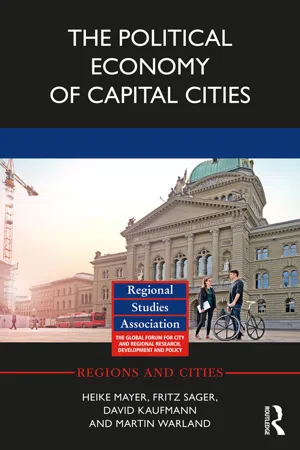
The Political Economy of Capital Cities
- 182 pages
- English
- ePUB (mobile friendly)
- Available on iOS & Android
The Political Economy of Capital Cities
About This Book
Capital cities that are not the dominant economic centers of their nations – so-called 'secondary capital cities' (SCCs) – tend to be overlooked in the fields of economic geography and political science. Yet, capital cities play an important role in shaping the political, economic, social and cultural identity of a nation. As the seat of power and decision-making, capital cities represent a nation's identity not only through their symbolic architecture but also through their economies and through the ways in which they position themselves in national urban networks.
The Political Economy of Capital Cities aims to address this gap by presenting the dynamics that influence policy and economic development in four in-depth case studies examining the SCCs of Bern, Ottawa, The Hague and Washington, D.C. In contrast to traditional accounts of capital cities, this book conceptualizes the modern national capital as an innovation-driven economy influenced by national, local and regional actors. Nationally, overarching trends in the direction of outsourcing and tertiarization of the public-sector influence the fate of capital cities. Regional policymakers in all four of the highlighted cities leverage the presence of national government agencies and stimulate the economy by way of various locational policy strategies.
While accounting for their secondary status, this book illustrates how capital-city actors such as firms, national, regional and local governments, policymakers and planning practitioners are keenly aware of the unique status of their city. The conclusion provides practical recommendations for policymakers in SCCs and highlights ways in which they can help to promote economic development.
Frequently asked questions
Table of contents
- Cover Page
- The Political Economy of Capital Cities
- Series Page
- Title
- Copyright
- Contents
- List of Figures
- List of Tables
- About the Authors
- Preface
- Acknowledgements
- List of Abbreviations
- 1 Introduction
- 2 Framework for Analyzing Secondary Capital Cities
- 3 Setting the Scene
- 4 The Economic Geography of Secondary Capital Cities
- 5 Locational Policies in Secondary Capital Cities
- 6 Conclusion: Deal with it – Ten Recommendations to Ensure Secondary Capital Cities thrive
- Appendix
- Index